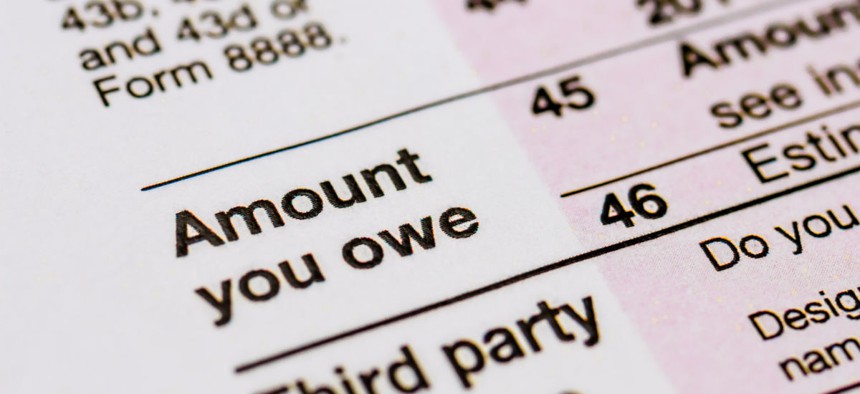
IRS Begins Privatization of Long-Term Tax Debt Collection
Union says federal employees slated to lose their jobs should be retrained for the positions.
The Internal Revenue Service unveiled its plan to turn over collection of outstanding tax debt to private companies, as required by Congress though a law passed in 2015.
The IRS identified four companies to collect unpaid taxes deemed “inactive” by the agency, meaning government personnel have ceased working on the accounts. The agency said “older, overdue” tax accounts and a lack of resources would prompt the IRS to tap the contractors to take up the collection.
CBE Group, Conserve, Performant and Pioneer will serve as the private collection agencies, or PCAs. Congress included as a provision of a highway bill late last year the requirement that the IRS outsource the debt collection, with supporters of the policy saying industry could more effectively bring in money Americans owe on their taxes. The law had required the IRS to enter into the contracts within three months, but they were just announced Monday and will not take effect until the spring of 2017 at the earliest.
The measure received significant pushback, including from most Democrats in Congress, who pointed to two abandoned efforts by the IRS to outsource the collection responsibility. In both the mid-1990s and again in 2006, the IRS contracted with PCAs to collect debt and in both instances the efforts were deserted amid financial losses and reported Fair Debt Collection Practices Act violations. Consumer and civil rights groups spoke out against the renewed privatization effort, as did National Taxpayer Advocate Nina Olson.
In previous arrangements with PCAs, the IRS allowed the companies to keep a share of the debts they collected, which led the government to lose money on the contracts. An IRS spokesman did not respond to an inquiry into whether the contracts would be structured similarly this time around.
The IRS said this time it will ensure the contractors observe debt collections statutes and are “courteous and respect taxpayer rights.” The agency also noted it would send delinquent taxpayers and their representatives two written letters notifying them of the transfer of their cases to the private companies.
“The IRS will do everything it can to help taxpayers avoid confusion and understand their rights and tax responsibilities, particularly in light of continual phone scams where callers impersonate IRS agents and request immediate payment,” the IRS said. The agency encouraged taxpayers to “stay vigilant” against potential fraud.
Detractors maintained the contracting is not in the best interest of taxpayers or the government. The National Treasury Employees Union, which represents IRS workers, said Congress has brought back the “PCA experiment” at a time when tax-related telephone scams have surged and the problems that plagued previous privatization efforts have not been addressed. Additionally, NTEU said, contractors are prohibited from entering taxpayers into the flexible payment arrangements IRS employees can negotiate.
Instead of contracting out the work, NTEU President Tony Reardon proposed the IRS retrain employees set to lose their jobs as paper tax return processors. The plan will affect more than 7,000 employees at multiple locations across the country by 2024.
“Many of these workers have been loyal employees of the IRS for decades but only some of them will get other jobs within the agency,” Reardon said. “The smart and humane thing to do would be to retrain the remaining workers to collect delinquent taxes rather than outsourcing IRS jobs.”
He added: “There’s absolutely no need for Congress to outsource this important work to the most complained about industry in America when there’s more than enough in-house talent available.”
Delinquent tax obligations belonging to taxpayers who are deceased, under the age of 18, victims of identity theft, in combat zones, subject to an installment agreement or right of appeal, in presidentially declared disaster areas and other situations will not be given to contractors for collection, the IRS said. For the debts the contractors do collect, taxpayers will be instructed to make payments on the IRS website or a check sent directly to the agency.







